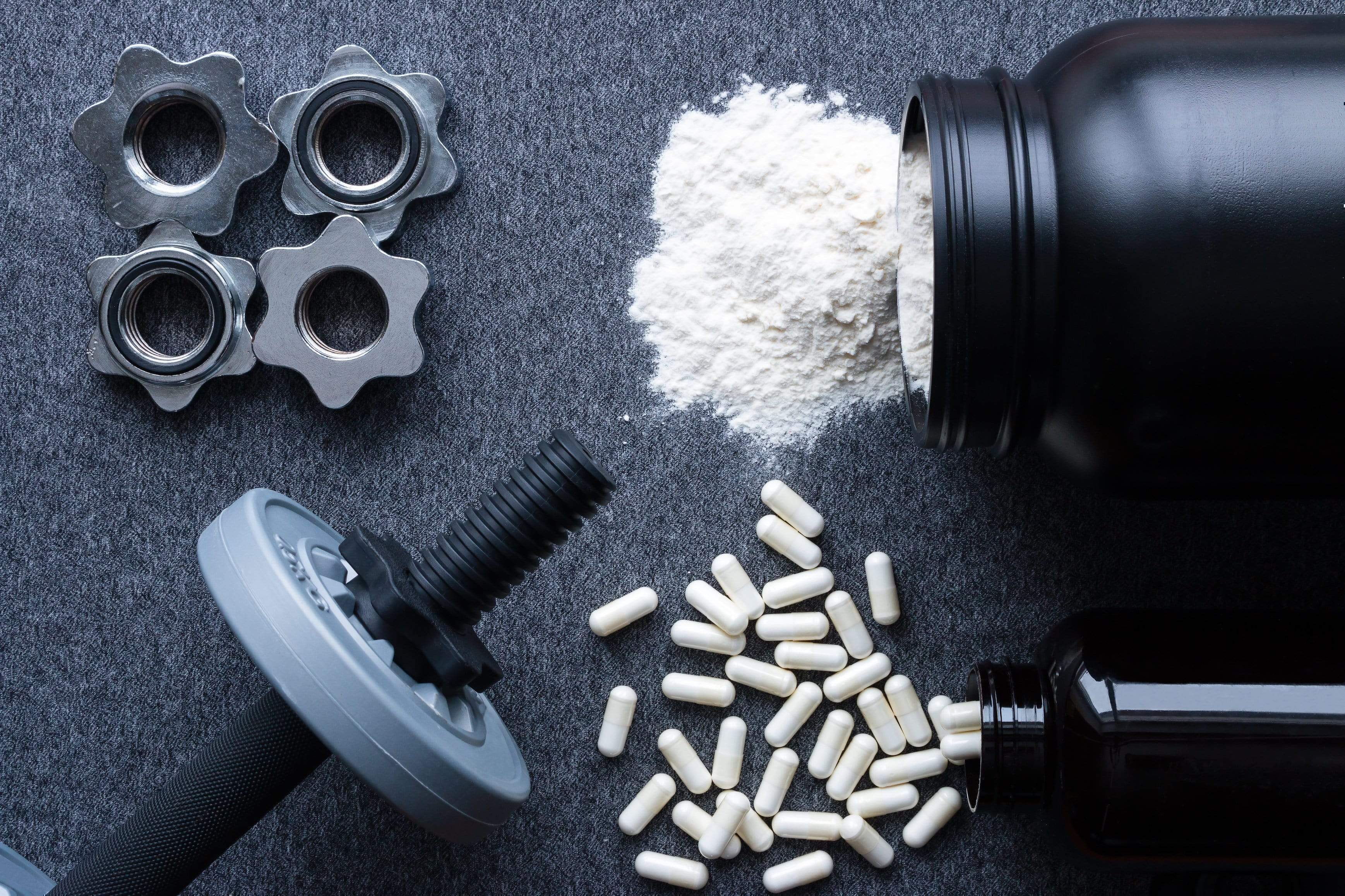Whether you're an athlete, serious about weight training or just looking to get more out of your workouts, creatine is definitely a supplement that you should consider taking.
As New Zealand's first choice supplement store, we stock dozens of creatine supplements from the world’s highest quality brands. If you're already a creatine convert, head over to our creatine supplement selection to find one that fits your lifestyle and workouts.
In this guide, we'll explain exactly what creatine is, what benefits it can bring to your workout and nutrition regimen, and how you should take it to optimise its effects. For those still wondering “what is creatine exactly?” and if you should be taking it, keep reading to find out everything you need to know.
What is creatine?
Creatine is an organic acid that occurs naturally in the body. It's mostly stored in skeletal muscle, where it acts as an energy reserve for intense bursts of activity such as sprinting or lifting weights. It has the ability to rapidly produce ATP (adenosine triphosphate), which is used as energy for all cells in the body, primarily muscle. Thanks to this unique trait, creatine is known to have numerous benefits for strength training and other potential applications as well.
Creatine was discovered in 1832 and initially isolated in pure form by researchers in the mid-1800s. Today, creatine is available as a dietary supplement and remains one of the most popular sports supplements on the market.
How creatine works
So, how does creatine work? When your body is working intensely, it relies on ATP for energy. However, ATP can only supply energy at a specific rate. So if you're pushing your muscles to their maximum, your body depletes its energy stores faster than they can be replenished.
This is when creatine comes into play. When ATP is depleted, creatine phosphate (CP) stores are broken down to form more ATP for energy. This reaction produces a lot of energy quickly, which is what you need for explosive and powerful movement.
Most adults store around 120g of creatine in their bodies, but you can increase this through supplementation. Essentially, by taking creatine, you can increase the total pool of CP in your body, which can be broken down to create ATP during workouts — giving you more energy for more effective workouts.
The different forms of creatine
You've probably seen many different forms of creatine supplements on the market. But which one should you choose?
- Creatine monohydrate is the most extensively studied and common form of creatine supplement available. It has been researched for over 20 years and is well known to be safe.
- Creatine hydrochloride (HCL) is another popular option. It's claimed to be more water-soluble than creatine monohydrate, allowing it to dissolve in the body more quickly. If you experience bloating or digestive discomfort from creatine monohydrate, then this may be a good option to consider.
- Creatine citrate, creatine phosphate, magnesium creatine chelate and Kre-Alkalyn (buffered creatine) are also commonly available, but there's not been as much research done to support their use.
Several major supplement brands offer their own formulations of creatine. As long as you're buying from a reputable brand, then you can be confident that the creatine is at least 99% pure. Any supplements that are labelled as "creapure" promise 99.9% purity.
Some creatine supplements are micronised, which means they're ground up into finer particles. This allows the supplement to dissolve in liquids more easily and can make it easier for you to mix your creatine powder with water or a sports drink.
If you're not keen on the powder texture of standard creatine monohydrate supplements, you might like to try creatine capsules. Capsules can be a convenient way to take creatine, especially if you're in a loading phase and taking high doses.
The benefits of creatine
Creatine has numerous benefits that can enhance your strength and performance in training, particularly during weightlifting or high-intensity interval workouts.
- Creatine can provide a boost in strength and endurance so you can push yourself harder for longer.
- Creatine benefits muscle recovery between sets and exercises so you can train harder, lift heavier weights or do more reps with a given weight.
- It can help create new muscle tissue and increase lean body mass. In turn, this helps improve overall body composition and boosts your metabolism.
- Creatine helps pull excess water into the muscles, allowing them to swell and look bigger. As well as providing psychological benefits such as increased confidence in the gym, this can help with muscle growth and performance.
- Taking a creatine supplement can increase your energy levels and improve mental focus, allowing you to push yourself further during training so you can get the most out of your workouts.
- Creatine has also been shown to have neuroprotective effects as well as benefits for cognitive performance.
Are there any side effects of taking creatine?
Creatine is considered highly safe, and its side effects are typically mild. However, some people experience mild stomach discomfort or cramping when taking creatine, especially at higher doses (20+ grams per day).
It's also a good idea to take creatine with a large glass of water and plenty of sodium (salt) since it pulls more fluid into the muscles.
You can minimise any potential adverse creatine side effects by talking to your healthcare provider, following dosage directions and increasing your water intake. You might also like to experiment with taking creatine at different times of the day, such as before or after training.
Most creatine supplements also contain other ingredients such as magnesium, dextrose or rice flour. These can help reduce any potential side effects further by providing more water and carbohydrate for better uptake into muscle tissue.
Who should take creatine?
Creatine is best suited for people who are regularly participating in intense workouts or weightlifting sessions. It can also enhance the performance of endurance athletes since it provides more energy for muscle contractions, which allows you to work harder for longer periods of time.
Creatine is a safe and well-tolerated supplement with numerous benefits, so anyone with a healthy diet and an active lifestyle may improve their health and be able to push themselves harder physically by adding it to their daily routine.
However, creatine supplements should be avoided if you are pregnant or breastfeeding since there is a lack of research in this area. You should also avoid taking creatine if you have a history of kidney disease or liver problems since it can increase the workload on these organs and lead to health complications. Always consult a health professional before taking any form of supplements.
How to take creatine
Creatine can be taken before or after training. We recommend taking it after your workout as this is generally better tolerated and can help reduce any stomach issues.
You can increase the effectiveness of your creatine supplement by taking it with a meal that contains carbohydrates and protein. This will help improve uptake into muscle cells and reduce any potential side effects of taking creatine on an empty stomach.
You can take creatine alone or in combination with other supplements such as protein powders, post-workouts and weight gainers. A dose of around 5g per day (1.5g for HCL) will usually suffice. An easy and popular way to do this is to mix your creatine with your other supplements and add it into a smoothie.
It's important to drink plenty of water with your dose since this can help improve uptake into muscle tissue and reduce any potential side effects.
Avoid taking creatine with caffeinated drinks such as coffee since this can limit creatine uptake into muscle cells and reduce its benefits.
Creatine can be taken daily for indefinite periods of time without any adverse health effects. However, it's less effective if you take the same dose every day over weeks or months at a time. This is because your body will eventually adapt to the dose, which leads to less uptake into muscle tissue.
How to cycle creatine
This leads us to cycling. Cycling creatine is an effective way to get the most out of creatine supplementation. To do this, you can simply take a one-month break every few months or follow a loading and maintenance cycle as follows:
-
Creatine loading phase
Creatine loading helps increase the uptake of creatine into muscle cells, which makes it more effective at boosting strength, energy and endurance during training.
Loading with 20g per day for up to five days is considered safe and most people will experience significant results from a creatine overload phase, even if they are already taking a regular dose on a daily basis.
-
Maintenance phase
After the loading phase, continue taking your regular dose of around 5g per day for at least one week. Then, reduce your dosage to one or two servings per week as a maintenance dose.
-
Time off
After about three months of this cycle, stop taking creatine for around four weeks and then begin the loading phase again, after which you can continue with this creatine cycle on and off.
When to take creatine
A common question many people have when they first start taking this supplement is when to take creatine for best results. You may be wondering if you can get the same benefits from taking it before or after your workout.
The main benefit of taking creatine after your training session is that this provides a boost in energy. It helps improve muscle recovery afterwards, so you will be able to train harder and more frequently throughout the week.
Taking creatine before your training session doesn't work as well for most people since it can lead to muscle cramping and, occasionally, nausea. If this happens, you won't be able to train as hard or you may even have to end your workout early.
However, some people may experience better results when taking creatine before their workout rather than after, so it's a good idea to experiment with both options and see which works best for you.
It's best not to take creatine on rest days as this can make you feel bloated, weigh down your performance in the gym and lead to poor sleep.
How to train on creatine
When using creatine, you should aim to train intensely for at least one hour in order to activate all your muscle cells and get the most benefit from taking it.
Combining creatine supplementation with resistance training will give you optimal results — this type of exercise helps increase the uptake of creatine into muscles to help improve strength and endurance.
However, you can take creatine before or after any kind of workout to give you more energy, reduce your recovery time and improve your strength, power and endurance during training.
Creatine can also be combined with other supplements to give you even better results. These include pre-workout supplements, protein powders, amino acids and carbohydrate powders.
Can I take creatine while cutting?
Creatine supplementation can be effective for weight loss since it helps promote muscle growth, strength and endurance during resistance training. If you're cutting, then creatine may help reduce any potential losses in lean tissue since taking it is associated with higher rates of protein synthesis and retention of muscle glycogen.
Creatine may also be helpful for preventing any weight loss from slowing down as you get closer to your target. It is an excellent supplement to take if you're trying to lose fat while maintaining or even building lean tissue.
Using creatine while cutting can also suppress your appetite, so it's easier to stick with a calorie deficit for weight loss.
Get creatine supplements from Sportsfuel to supercharge your workouts
Creatine is safe, effective and is one of the best supplements for boosting your strength, power and endurance during training. At Sportsfuel, we offer one of the widest ranges of supplements and sports nutrition in New Zealand, including all the top brands.
To find out which is best for your training goals, take a look at our range of creatine supplements online today.
References:
1. Wang, C., Lin, S., Hsu, S., Yang, M. and Chan, K., 2017. Effects of Creatine Supplementation on Muscle Strength and Optimal Individual Post-Activation Potentiation Time of the Upper Body in Canoeists. Nutrients, 9(11), p.1169.
2. Cooke, M., Rybalka, E., Williams, A., Cribb, P. and Hayes, A., 2009. Creatine supplementation enhances muscle force recovery after eccentrically-induced muscle damage in healthy individuals. Journal of the International Society of Sports Nutrition, 6(1).
3. Olsen, S., Aagaard, P., Kadi, F., Tufekovic, G., Verney, J., Olesen, J., Suetta, C. and Kjaer, M., 2006. Creatine supplementation augments the increase in satellite cell and myonuclei number in human skeletal muscle induced by strength training. The Journal of Physiology, 573(2), pp.525-534.
4. Powers ME, Arnold BL, Weltman AL, et al. Creatine Supplementation Increases Total Body Water Without Altering Fluid Distribution. J Athl Train. 2003;38(1):44-50.
5. Avgerinos KI, Spyrou N, Bougioukas KI, Kapogiannis D. Effects of creatine supplementation on cognitive function of healthy individuals: A systematic review of randomized controlled trials. Exp Gerontol. 2018;108:166-173. doi:10.1016/j.exger.2018.04.013
6. Beal MF. Neuroprotective effects of creatine. Amino Acids. 2011 May;40(5):1305-13. doi: 10.1007/s00726-011-0851-0. Epub 2011 Mar 30. PMID: 21448659.




